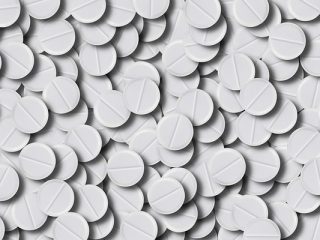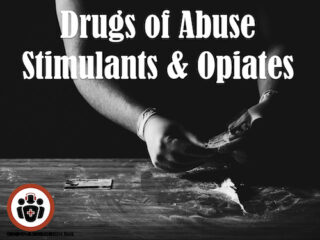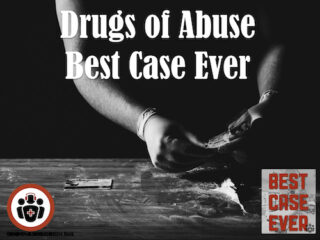Toxicology
Best Case Ever 41 Opiate Misuse and Physician Compassion
Opiate misuse is everywhere. Approximately 15-20% of ED patients in the US are prescribed outpatient opiates upon discharge. In Ontario, about 10 people die accidentally from prescription opiates every week. Between 1990 and 2010, drug overdose deaths in the US increased by almost four fold, eclipsing the rate of death from motor vehicle collisions in 2009. This was driven by deaths related to prescription opiates, which now kill more people than heroin and cocaine combined. Opiates are the most prescribed class of medication in the US. In 2010, one out of every eight deaths among persons aged 25 to 34 years was opiate-related. Four out of 5 new heroin users report that their initial drug was a prescription opiate. In Ontario, three times the people died from opiate overdose than from HIV in 2011. Yet, we are expected to treat pain aggressively in the ED. Dr. Reuben Strayer, the brains behind the fantastic blog EM Updates tells his Best Case Ever, in which he realizes the importance of physician compassion in approaching the challenging drug seekers and malingerers that we manage in the ED on a regular basis. This Best Case Ever is in anticipation of an upcoming main episode in which Dr. Strayer and toxicologist Dr. David Juurlink discuss how to strike a balance between managing pain effectively and providing the seed for perpetuating a drug addiction or feeding a pre-existing drug addiction, and how we best take care of our patients who we suspect might have a drug misuse problem.
Best Case Ever 37 Neonatal Lazy Feeder
On this EM Cases Best Case Ever Dr. Anthony Crocco, the Head and the Division Head of Pediatric EM at McMaster University and Medical Director of Pediatric Emergency Medicine at Hamilton Health Sciences Hosptial, discusses an approach to the neonatal lazy feeder and why we should abandon the use of codeine in pediatrics as well as in breastfeeding mothers. The approach to the neonatal lazy feeder should be considered as an approach to altered level of awareness with a wide differential diagnosis, and there is one question that should always be asked of the neontal lazy feeder....
Best Case Ever 33: Over-correction of Hyponatremia
Rapid over-correction of Hyponatremia can have devastating consequences: for one, osmotic demyelination syndrome (ODS) can result in destruction of the pons and a locked-in state. We don't see ODS very much as it's onset is delayed and usually sets in after the patient is admitted to hospital (or worse, sent home). Nonetheless, we need to know how to manage Hyponatremia in the ED so that we prevent ODS from ever happening. In this Best Case Ever, Dr. Melanie Baimel describes the case of a young woman who came in to the ED after drinking alcohol and taking Ecstasy, wanted to leave AMA after her Hyponatremia had inadvertently been corrected too rapidly, and the conundrum that ensues. In the upcoming episode, Dr. Baimel and the first ever Internal Medicine specialist on EM Cases, Dr. Ed Etchels, discuss a rational step-wise approach to managing Hyponatremia, tailored for the EM practitioner; when you might consider giving DDAVP in the ED, the best way to correct Hyponatremia, how to manage the patient who's Hyponatremia has been corrected too quickly, and an easy approach to the differential diagnosis. Get a sneak peak at the algorithm that will be explained and reviewed in the upcoming episode...... [wpfilebase tag=file id=577 tpl=emc-play /] [wpfilebase tag=file id=578 tpl=emc-mp3 /]
Best Case Ever 26: Chloral Hydrate Poisoning and Cardiac Arrest
I met up with Mike Betzner at North York General's Update in EM Conference in Toronto. He is the medical director of Air Transport STARS air ambulance out of Calgary and an amazing speaker on the national lecturing circuit. His Best Case Ever on Chloral Hydrate poisoning & cardiac arrest describes a young man in cardiac arrest with resistant Ventricular Fibrillation and Torsades de Pointes. There is only one class of drugs that can get him back into normal sinus rhythm. Dr. Betzner describes how he recognized that this patient was suffering from Chloral Hydrate poisoning and how he saved his life with one simple intervention.
Episode 27: Drugs of Abuse – Stimulants and Opiates
Dr. Margaret Thompson & Dr. Lisa Thurgur Canada's toxicologist gurus discuss several cases of stimulant drugs of abuse such as cocaine, MDMA & bath salts, as well as the pearls and pitfalls of managing opiates toxicity. We discuss: The management of the intoxicated patient including seizures, dysrhythmias, cardiac ischemia and hypertensive emergencies related to cocaine toxicity, the recognition and management of necrotizing vasculitis caused by cocaine cut with Levamisole, the differential diagnosis and management of the "hot and crazy" patient, including the role of dantrolene and cyproheptidine, pearls and pitfalls of naloxone, the utility of urine drug screens and much more....
Best Case Ever 12: Drugs of Abuse
As a bonus to Episode 27 on Drugs of Abuse -Stimulants & Opiates, Dr. Margaret Thompson, one of Canada's leading Toxicologists and the medical director of the Ontario Poison Control Centre tells us 2 of her Best Cases Ever about stimulant overdose surprises. In the related Episode, Dr. Margaret Thompson & Dr. Lisa Thurgur Canada's toxicologist gurus discuss several cases of stimulant drugs of abuse such as cocaine, MDMA & bath salts, as well as the pearls and pitfalls of managing opiates toxicity. We discuss: The management of the intoxicated patient including seizures, dysrhythmias, cardiac ischemia and hypertensive emergencies related to cocaine toxicity, the recognition and management of necrotizing vasculitis caused by cocaine cut with Levamisole, the differential diagnosis and management of the "hot and crazy" patient, including the role of dantrolene and cyproheptidine, pearls and pitfalls of naloxone, the utility of urine drug screens and much more.... [wpfilebase tag=file id=396 tpl=emc-play /] [wpfilebase tag=file id=397 tpl=emc-mp3 /]







